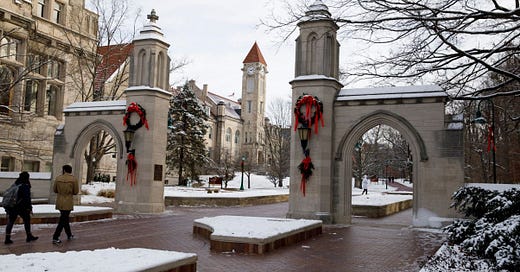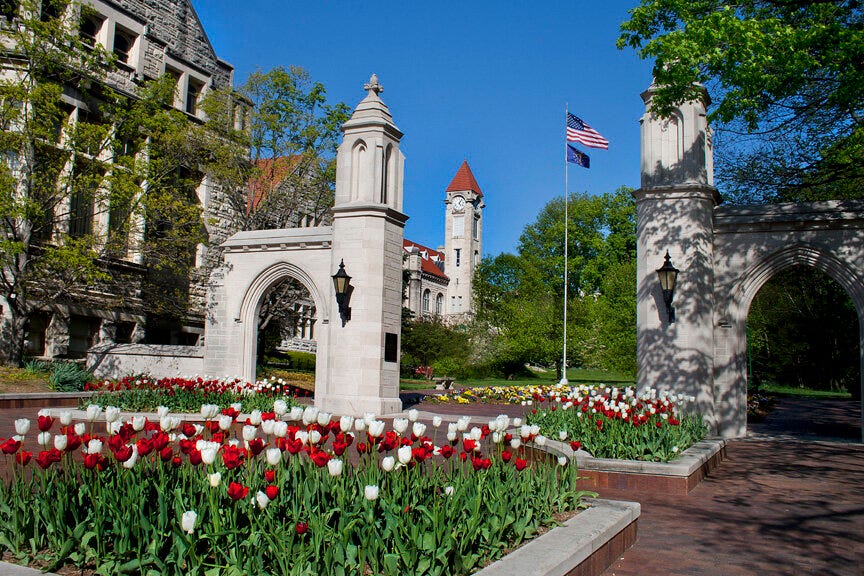I began my PhD at Indiana University in August of last year. My program is in “higher education,” which means I go to college to study colleges.
Since arriving, I’ve taken 8 courses. I want to describe the biggest “project” or “result” from each course. Based on that, I hope to examine some emergent themes and think about what it might mean about what comes next for me.
Fall 2023
1. First-year seminar
This course is required for all new doctoral students in the higher education program. It serves as a way to familiarize us with how doctoral programs work, meet with all the faculty in our program, and begin honing some of the skills we’ll need.
The biggest project was a thematic literature review and reflection. When you apply to a doctoral program, you have to make some statement about what you plan to focus on. We all have to produce a dissertation eventually, so we are encouraged to think about it from the jump. In this project, we had to take that initial statement of intent and begin assembling a scholarly library related to it.
My subject was “general education.” I want to study curriculum, and I thought that studying how colleges require certain courses would be a good place to think about how they conceptualize the structure of their curriculum. This helped me get familiar with the language of the field and form some initial impressions. I also got much better at producing citations without having to check the manual every time, and I learned how to summarize scholarly work much better.
2. Foundations of Educational Philosophy
This course was outside my department. It’s not required, but I took it to satisfy elective credits for research methods. It was a small seminar, just 8 students. The focus was on tracing some of the dominant empirical frameworks (some would say “paradigms”) of research to their origins. So instead of reading modern work, it was more focused on Descartes, Hume, Kant, Hegel, and their friends.
This course mostly had a series of reflections, rather than a culminating project. The biggest standalone project I did was a presentation on Hegel’s “Lord-bondsman dialectic.” This course, as fits its name, mostly helped set me up to better understand subsequent courses.
3. Research Methods
This was also outside my department, but it is required for all doctoral students in the School of Education. The goal is to familiarize students with the basic terms and methods of quantitative and qualitative methods. Because it’s so broad in its scope, we did a little of everything and not much of any one thing.
The culminating work here was also not particularly individualized. I had two major take home exams, the bulk of which focused on evaluating proposals for qualitative and quantitative studies and proposing our own solutions to the incomplete plans in them.
4. History of Higher Education
This was required for my department, and it mostly consisted of first-year doctoral students. The scope is pretty clear, as it served as our introduction to the development of the university in the United States. It did not have the scope to include other countries. I read a ton for this class, and I at least feel somewhat literate about the “timeline” after having taken it.
The culminating project here was actually pretty substantial. We had to produce original historical research using archival materials. I decided to double down on my interest in general education by researching the general education reform which took place at my alma mater, Wheaton College, in 2015.
I traveled to Wheaton and spent two days in their archives. That sounds more dramatic than it was. What actually happened is I requested some sets of documents and then sat at a table and reviewed them for two days. I also conducted an interview with a former professor who was involved in the process.
My final project essentially just synthesized these disparate documents on the history of general education reform. This created a context for the 2015 reform, and it helped me distinguish what was unique about that program compared to previous efforts. This was a very satisfying project, as it was the first time I was able to produce something that felt “new,” even if I was just describing other documents.
Spring 2024
5. Teaching College History
This course was the first I’ve taken outside the School of Education. I am pursuing a certificate in “college pedagogy,” and this course was an option as one of the four courses I need for it. The first part of the class was about familiarizing students with debates on history instruction: how to create assignments, how to deliver information, what to do with online classes, etc.
The second half was a group project that ended up being pretty exciting. We took a set of essay exams from another class at IU, and we were told to use them to ask a new question about teaching. Our group focused on how the wording of the essay prompts connected to the types of evidence used in student responses, as well as the overlap of themes in those responses. I created a tool for assessing “evidence quality.” It may have been amateurish, but it was interesting doing a new kind of research.
6. Foundations of Institutional Research
This was offered by my department, but it is not required. It’s part of a two-course sequence (which I will finish next fall) about how universities study themselves. Institutional Research (IR) is an office at practically every college, and it oversees public and internal reporting, accreditation, and administrative inquiries for planning. I’m pursuing another “certificate” in this field as well, and I needed to take this course for that.
The culminating project here was on a topic I chose. I am mostly interested in cross-institutional comparisons (as opposed to looking at sub-populations within a single institution), so I decided to do an IPEDS-based inquiry. IPEDS is a federal data reporting system which publishes tons of information about any university which collects federal funding (i.e. most universities).
Specifically, I decided to focus on a topic I brought up in my last post: tuition-free colleges. I looked at the seven tuition-free colleges and compared them with a sample of tuition-collecting colleges here in Indiana.
The most interesting finding was that the only predictable difference between the two was the yield-admit ratio. That refers to the comparison between the percentage of accepted students who enroll in the institution (yield) and the percentage of applicants who are accepted (admissions rate).
Schools with high yield are the “first choice” of more of their applicants. Schools with low admissions rates get many more applicants than they have spots for. Having a ratio skewed toward yield connotes prestige, while a ratio skewed toward admissions rate connotes a lack of prestige. The absence of tuition is such an application driver and difference maker in enrollment that it can make places like Webb Institute or the Merchant Marine Academy look like Ivy League institutions in terms of their yield-admit ratio.
7. Qualitative Inquiry
This was offered outside my major, but I’m pursuing a qualitative inquiry certificate (I want lots of certificates), so this was required for that. It was also taught by the same professor who taught my other two research method courses and built on them.
The purpose of the course was learning how to do social research in person, basically, as well as the philosophical grounding for why you’d do it. The focus was on observation, interviewing, and focus groups. But more than just learning methods for conducting those things, it was especially about how to process the data from them afterwards.
I really had two major projects. The first was a focus group where we met for two hours and recorded the conversation. The second was a one-on-one interview that I conducted with another student. In both cases I produced a transcript and annotated that transcript with notes on non-verbal behaviors and interpretations of meaning.
I also “coded” the transcript by categorizing what I’d heard and bringing different parts of the text together to establish “themes” to build on for further reflection. For both pieces, I “member checked” to make sure that the way I was interpreting my subjects was consistent with how they saw themselves.
For the interview I then produced a preliminary analysis, linking the codes I’d produced for it to the social environment that produced them, but this was very abstract and not something I’d do based off one interview in the real world.
Member checking was probably the most important theme in this class. For social research, the criterion for validity is whether the subject sees themselves represented in your product. If you come to conclusions about them that they think are ridiculous, you’ve gone awry somewhere along the line. This prevents researchers from being detached elites and forces them to see research subjects as partners, not as lab rats.
8. Higher Education Organization & Administration
This course is required for my degree. Its focus is on the theories behind how scholars talk about university structure. The focus is largely on staffing, faculty, leadership, and decision making processes. This is another “we’re going to throw a lot at you in an attempt to make you somewhat literate” class.
My final project was an application of some of those theories to an issue connected to my dissertation plans. Once again I decided to focus on one of my almas mater. I did a case study of the 1937 curricular reform at St. John’s College and saw how its internal governance shifted to address different theoretical concerns over the next decade. I learned a lot about the time period, and it felt good to take some of the very abstract material we’d done in class and make it more tangible.
Reflection
A lot of my papers this year ended with reflections. But this post has gone on long enough, so I’ll be brief.
Basically what I see in writing all this out is that I’m going to keep fixating on the curricula of unusual institutions. I took a lot of research methods classes (and hope to do more) because I want to find novel ways of asking questions about novel colleges. I think my next step is focusing projects on colleges that I haven’t already attended.
-Matt






